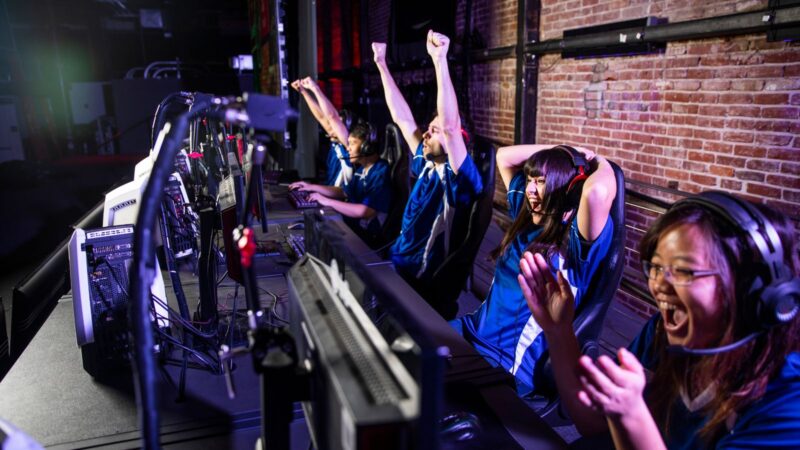
On October 18th, 2019 gaming company Blizzard’s Chief Development Officer and EVP, Jen Oneal, stated its commitment to creating engaging and meaningful content for their games. The announcement was met with enthusiasm from many gamers, but also generated some criticism from others who felt that this commitment did not extend to Blizzard’s parent company, Activision.
This paper will outline the implications of Ms. Oneal’s statements about Blizzard and Activision and how they may affect gaming communities.
We will begin by providing an overview of Blizard’s corporate structure and how it relates to its parent company Activision. We will then discuss how Ms. Oneal’s statements have been interpreted by different members of the gaming community. We will also analyze how potential changes in game content could lead to changes like user engagements with these games. Finally, we will consider some potential implications for Blizzard and Activision if these changes are adopted and implemented successfully.
Background
Jen Oneal was briefly in charge of Blizzard during tumultuous change in the video game industry. During that time, she expressed no faith in the leadership of Activision Blizzard’s parent company, Activision. This elicited a strong response from the company, as many of their decisions had been questioned.
In this article, we will discuss the implications of Jen Oneal’s statements for both Blizzard and Activision.
Jen Oneal’s Role at Blizzard
Jennifer Oneal, the former Executive Producer of Blizzard Entertainment’s Overwatch league, played a crucial role in establishing the league’s future. As part of her role as Senior VP at Activision (the parent company of Blizzard), she was responsible for overseeing multiple esports tournaments and initiatives associated with Overwatch. This included managing teams and talent, organizing events, creating publications and driving innovation within the esports ecosystem.

During her tenure with Blizzard, several groundbreaking changes and policies were implemented that changed the trajectory of esports tournaments and leagues associated with Blizzard titles. Oneal was also instrumental in introducing new and exclusive content to engage fans — she was known for being highly vocal on social media when promoting game-related events or activities.
Jen Oneal left Blizzard after two years in 2019 and has not commented directly on her departure or any related changes at the company since then. However, many media outlets have highlighted how Jen’s insights into managing an eSports industry can be used by other organizations as well as Activision’s subsidiary companies such as Kingoom Games which dove deeply into mobile gaming production with its award winning title “The Elder Scrolls IV: Blades” which released earlier this year. Activision/blizzard will likely look to build upon jen’s legacy regarding its future strategic plans with e-sports leagues in particular.
Jen Oneal’s Statements
On the 18th of May 2019, Jen Oneal, formerly President and COO of Blizzard Entertainment, made some controversially opinionated statements regarding various topics within the gaming industry. These statements had far reaching implications for both Activision/Blizzard and the gaming industry as a whole.
In her statement, Jen expressed her feelings that gamers were being misrepresented by game companies like Blizzard. She felt that game developers should be looking to serve their consumers more closely and consistently than they currently do. She also expressed frustration that companies are more inclined to ignore consumer demands in favor of what they perceive will make a profit.
On a disappointing note, she had become disillusioned with the current game industry and linked her departure from the company to her arguments with upper management over its direction.
Jen’s statement was widely controversial due to its contents being seen as negative towards Activision/Blizzard’s current business practices. Her statements could be interpreted as suggesting that Activision/Blizzard was neglecting consumer feedback in pursuit of sales, leading to blustered accusations from disgruntled gamers around the globe condemning their approach towards development. This uproar potentially caused irreparable damage to public opinion on the company regardless of its actual policies regarding consumer input or feedback responsiveness regarding development projects or decision making processes.
Implications for Blizzard
Recently, Jen Oneal made a shocking statement about her lack of faith in Activision leadership and many are wondering what this could mean for Blizzard and its employees. This statement has placed the future of Blizzard in an uncertain position as it calls into question the fate of the beloved gaming company.
In this article, we will explore the implications of Jen Oneal’s statements for Blizzard and Activision.

Impact on Employee Morale
The statements from the former Executive Vice President of Blizzard, J. Allen Brack, directed towards his employees after Blitzchung’s announcement have caused a stir within Blizzard and Activision. Employees have expressed real concern about the message that these statements convey to them: namely, that their freedom of expression is being limited and boundaries are being set on which topics are open for discussion. This has led to decreased morale as many people feel they can no longer speak openly without fear of retribution from upper management or public opinion.
This sense of unease and insecurity has implications not only for current employees, but also for those who may consider joining Blizzard or Activision. Potential applicants may not want to become part of a company where they believe their voices will be challenged or limited. This could create a talent pool problem and affect production in the long run, given that quality employees are essential for any successful business model.
Furthermore, any potential blowback on social media could hurt both companies’ reputations further by driving away customers who might be wary about what will happen if they find themselves being affiliated with either Blizzard or Activision. The effects on both current employees and potential customers needs to be taken into account when evaluating the impact of J Allen Brack’s message towards his team members.
Potential Impact on Future Projects
It is difficult to accurately gauge the potential impact of Jen Oneal’s statements on future projects at Blizzard and Activision. However, the messages sent by management suggest a desire to shift away from a purely corporate-driven approach in favor of increased community representation and engagement.
The statements also indicate a willingness to address longstanding issues related to under-representation, harassment and toxicity in games such as Overwatch and Hearthstone.
How this will manifest itself practically remains to be seen, but it could include changes in staffing structures, resource allocation and promotional materials. Ultimately, Blizzard may emphasize community feedback when planning new releases or updates for existing titles.
Meanwhile, more resources may be allocated towards initiatives such as social inclusivity and diversity programs that have been absent from the company’s agenda for some time.
It is too early to tell whether these measures will positively impact the short term or result only in small-scale adjustments rather than systemic change within Activision-Blizzard itself.
Nonetheless, making decisions with an eye towards player experience rather than profits could prove beneficial in rebuilding consumer trust and countering public distrust intensified by recent controversies.

Implications for Activision
When Jen Oneal, briefly in charge of Blizzard, expressed her lack of faith in Activision’s leadership, it sent shockwaves throughout the industry. It was a bold statement from a seasoned executive who had been at the top of a major game developer for almost a decade.
While the exact implications of Oneal’s words remain, it’s safe to say that Activision and Blizzard are likely feeling the heat.
This article will explore the potential implications of Oneal’s statements for Activision and Blizzard.
Conclusion
After analyzing Jen Oneal’s statements, it is clear that these implications could have a significant impact on Blizzard and Activision in the short-term and the long-term. In the short-term, her statements might damage public confidence in Blizzard’s policies and activations, potentially leading to decreased sales and an erosion of customer loyalty. In the long term, the integrity of Blizzard and its ability to manage other customers fairly would be at stake.
At this time, it appears that Blizzard has not taken steps to rectify any potential negative effects of Oneal’s statements. It is important for Blizzard to take responsible action to address this issue in order to protect their corporate image and restore customer trust. This can be done through direct dialogue with gamers as well as through targeted marketing campaigns that highlight their commitment to ethical practices. If successful, this corrective action can help mitigate any permanent damage from the fallout from Oneal’s comments.
tags = brief position as co-leader of Blizzard Entertainment, blizzard leadership turnover, activision blizzard jen oneal onealminottiventurebeat, activision blizzard blizzard oneal mike onealminottiventurebeat, blizzard leader resignation











